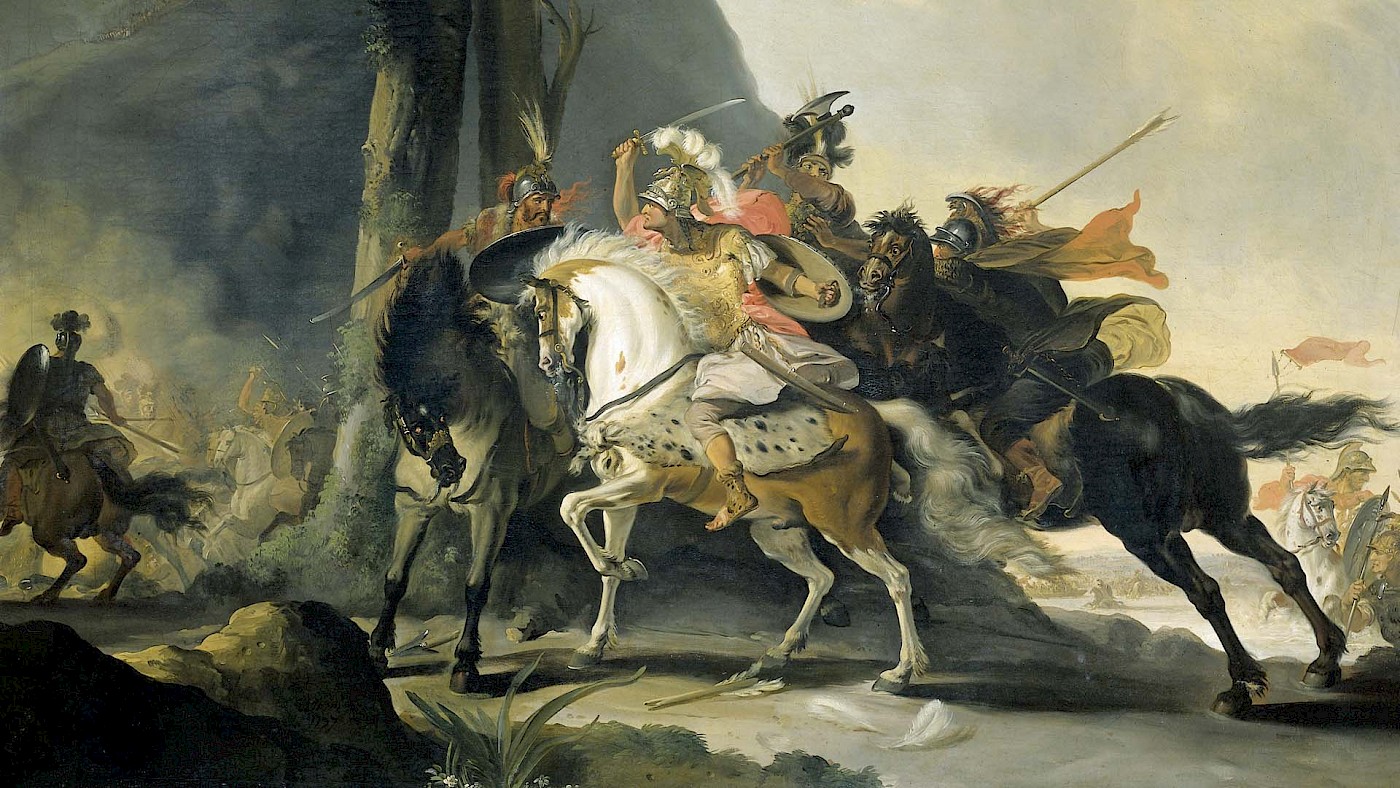Last Wednesday, I wrote an article about Artemisia of Halicarnassus and how the story of her advice being rejected by Xerxes shouldn’t be taken at face value. I noted how Greek writers often depict the Persian king (or his representatives) not heeding the apparently good council of (non-Persian) advisers, only to be proven wrong later.
This particular motif or topos is also found in the main work of the Greek writer Arrian (ca. AD 86 to ca. 160), the Anabasis of Alexander. This book is one of the key sources of information for Alexander the Great’s conquest of the Persian Empire, though its accuracy is a matter of some dispute, especially in the light of contemporary Near-Eastern sources.
Take, for example, the account of the Battle of Gaugamela (331 BC) known from Greek and Roman writers, including Arrian. In Arrian, the battle is discussed in book three (3.8.3-3.15.4). A key element in the description of the battle among Greek and Roman writers is that Darius III, the king and commander of the Persian forces, flees from the battle, abandoning his troops in the process.
But according to the cuneiform tablets known as the Astronomical Diary, a contemporary source, the Persian army was demoralized and fled during the battle, effectively abandoning Darius III, who was thus in turn forced to flee (see: Paul Bernard, “Nouvelle contribution de l’épigraphie cunéiforme à l’histoire hellénistique”, in: Bulletin de correspondance hellénique 114.1 (1990), pp. 513-541). Of course, it can be countered that the writers of the cuneiform tablets tried to depict their ruler in as favourable a light as possible, and that these tablets are therefore not necessarily more trustworthy than the Greek and Roman material.
Memnon of Rhodes
It’s clear that Arrian’s text has a number of similarities to Herodotus’ Historiai. When Alexander launched his campaign into Asia in 334 BC, the Persian satraps (governors) met to discuss what they should do. Among their number was Memnon of Rhodes, who “advised them not to take a chance against the Macedonians, whose infantry, he said, was far superior to their own” (1.12.9; Landmark edition). If this sounds familiar, it should: remember from my earlier article that Artemisia advised Xerxes not to fight the Greeks at sea because they were superior seamen.
Memnon instead advised his colleagues to “march ahead, destroying the grazing land by trampling it with the cavalry, and burn the standing harvest, not even sparing the cities themselves; Alexander would not remain in the country, he said, if provisions were scarce” (1.12.9). Arrian comments that one of the satraps, Arsites, declared that he would not permit the loss of even a single house. None of the other advisers sided with Memnon, because they believed he had ulterior motives. Memnon, after all, was a Greek, and may therefore have seemed untrustworthy.
But Memnon was nothing if not a loyal supporter of the Persian King’s cause. The decision to stand and fight led to the Battle at the Granicus River (334 BC), where Alexander’s army routed the Persian troops, including the strongest of the Persian cavalry, among whose number was Memnon himself. Alexander was able to launch the rest of his conquest from the victory at Granicus. If the Persians had followed Memnon’s advice, they might have been able to stop him in his tracks here, in Asia Minor.
Memnon of Rhodes died just a year later, in 333 BC (Arrian 2.1.3), but not without proving himself a thorn in Alexander’s side. He managed to implement his scorched earth policy when he abandoned and torched the city of Halicarnassus (1.23-1-4). Darius III appointed him commander of the entire fleet and the entire Anatolian coast (2.1.1), and he may have attempted to cut off Alexander’s line of supply when he lead a Persian fleet to the island of Lesbos (2.1.1-2). But it all proved to be a case of too little, too late.
The story of Memnon reads well, but deserves to be treated with a healthy dose of skepticism. Again, we encounter a sage non-Persian leader, whose initial advice is turned down for shortsighted or ill-advised reasons, only to be proven correct later. As icing on the cake, Memnon isn’t just non-Persian, but actually a Greek, from the island of Rhodes. He’s described as capable and energetic: a suitable – and suitably Greek – foil for Alexander the Great.
It’s difficult to disentangle truth from fiction. Memnon no doubt existed and he may well have been as capable a commander as Arrian makes him out to be. But Arrian, like Herodotus, wasn’t privy to what was said in Persian meetings, and the details are no doubt a little embellished to suit the kind of story that he wanted to tell.
